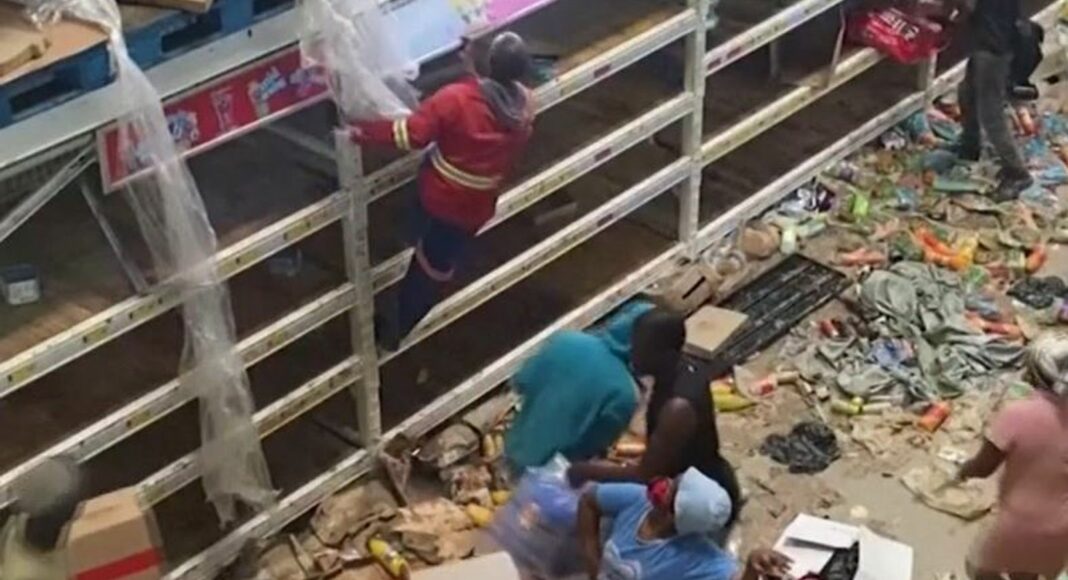At least 72 people have been killed and 1,234 arrested during unrest in South Africa sparked by the imprisonment last week of former president Jacob Zuma, according to police.
Major General Mathapelo Peters said many of the deaths were caused by stampedes of people when shops were being looted.
Thousands of people have stolen food, electric appliances, alcohol and clothing from retail centres, vehicles have been burned, businesses vandalised and debris left strewn across roads.
Image:
Apprehended looters with their goods on the floor inside a store in Vosloorus near Johannesburg
Major Peters said 27 deaths are being investigated in KwaZulu-Natal province and 45 in Gauteng province as the military struggles to quell the rioting despite using stun grenades and rubber bullets.
Ten people were crushed to death in a stampede during a mass looting at Ndofaya shopping centre in Gauteng, South Africa’s most populous province which includes the largest city, Johannesburg.
Major Peters said officers were investigating fatalities from crushing, as well as deaths caused by explosions when people tried to break into cashpoints, and other fatalities caused by shootings.
Minister Khumbudzo Ntshavheni has told Sky News that the government was concerned about the violence because it was threatening lives and livelihoods.
She said those involved in the rioting “are pillaging distribution centres of retail companies… and demolishing malls”.
Image:
Several people have died during a mass looting in Soweto
She said it was “pure criminality” not protests but said the “fundamental issue” was the socio-economic challenges of the country, especially high youth unemployment and general unemployment.
Ms Ntshavheni said lockdowns were currently the sole way to prevent the spread of COVID-19 in South Africa because only 5% of the population so far has been vaccinated.
She added: “Lockdowns ensure people do not go to work, but most companies are not operating and most people are losing jobs and with that you increase unemployment.”
Analysis by John Sparks, Africa correspondent
The violence and unrest in South Africa, which began after the arrest of former president Jacob Zuma last week, does not constitute a protest movement – nor does this represent some sort of ‘Arab Spring’ moment.
Instead, it appears to be an exercise in mass-opportunism as residents of largely impoverished communities take advantage of the fundamental weakness of the South African state.
In communities like Alexandra and Tembisa on the outskirts of Johannesburg, police officers and soldiers have been unable to establish order with residents and others who show no willingness to comply.
The police use rubber bullets but they do not seem to frighten the looters – while the soldiers carry live rounds that they dare not fire.
The consequences of such an act are fraught with risk and would invite comparisons with the Marikana massacre, when the South African police shot and killed 34 miners in 2012.
For the moment, the authorities look impotent and the looters and the troublemakers are taking full advantage.
She described youth unemployment as a “ticking time bomb” that is “going to explode”, insisting the government has been working to create jobs.
More than half of South Africa’s 60 million people are living in poverty, with an unemployment rate of 32%, according to official statistics.
Follow the Daily podcast on Apple Podcasts, Google Podcasts, Spotify, Spreaker
The pandemic, with job cuts and an economic downturn, has increased the hunger and desperation that helped propel the protests triggered by Zuma’s arrest into wider rioting.
The escalating violence was triggered last week when the former leader began a 15-month sentence for contempt of court.
The 79-year-old was convicted of defying a court order to testify before a state-backed inquiry probing allegations of corruption during his term as president from 2009 to 2018.
Image:
A soldier tackles looters at a shopping centre as violence escalates
Despite the deployment of 2,500 soldiers to support the South African police, the rampant looting has continued, though arrests are being made in some areas in Johannesburg, including Vosloorus in the east of the city.
Image:
Suspected looters are held at a taxi rank shops in Soweto
Troops on the streets amid riots in Johannesburg
The pro-Zuma violence spiralled into a spree of criminal theft in poor township areas of the Gauteng and KwaZulu-Natal provinces, witnesses said.
So far, the violence and looting have not spread to South Africa’s other nine provinces.
Image:
Looters carry items at Letsoho Shopping Centre in Katlehong, east of Johannesburg
The Constitutional Court, the country’s highest court, heard Zuma’s appeal against his sentence on Monday.
Zuma’s lawyer has argued that the top court made errors when sentencing the former president to prison.
Following 10 hours of testimony, the court judges said they would study the arguments and announce their decision at a later date.




